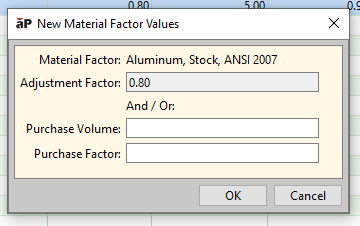To modify a cell in the Material Factors table (see Material Factors Table), double click the cell and enter a value. Note that only the following columns are editable:
-
Adjustment Factor (for a node’s first row only)
-
Purchase Volume
-
Purchase Factor
Creating an additional row for a given node
-
Right click the node and select Add Values…:
Figure: Material factory table
The New Material Factor Values dialog appears:
-
Enter a Purchase Volume and Purchase Factor.
No two rows of the same node can have the same value for Purchase Volume, and only a single row of a given node can be blank for Purchase Volume. Purchase Volume can be empty only if Purchase Factor is empty.
-
Optionally, enter an Adjustment Factor if the node’s first row does not specify an Adjustment Factor.
-
Check the Default checkbox if you want this new row to be the node’s default row. The default row is used for the node when the end user has not specified a purchase volume (see Change material purchase volume in the aP Pro User Guide).
-
Check the Disable Accumulated Purchase Volumes checkbox if you want to prevent purchase volumes defined by ancestors of the node from being available to scenarios to which this node and its descendants apply (see Change material purchase volume in the aP Pro User Guide).
Note: You can update values in the Base Cost per Unit field by editing Base Cost per Unit in the relevant Materials table, see To add or update a material field.

